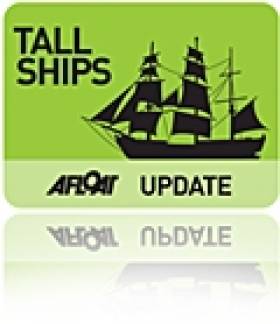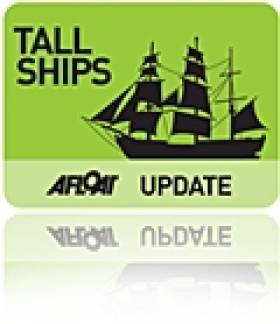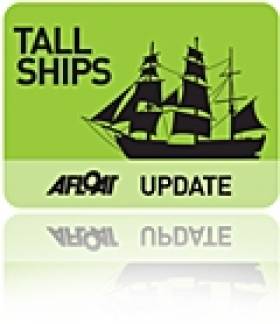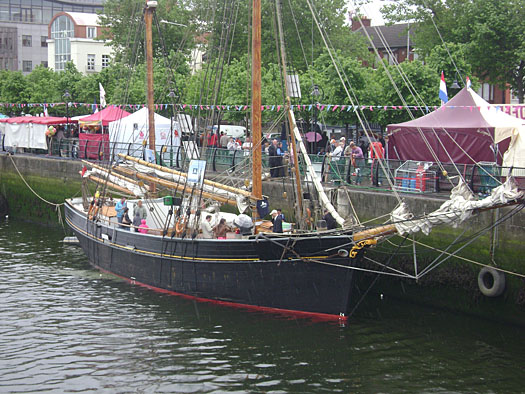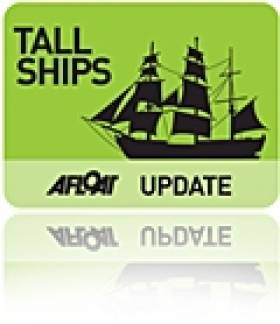Displaying items by tag: Bessie Ellen
#TallshipsBerthBoyne-This morning five beautiful tallships are arriving at the mouth of the Boyne for the second Irish Maritime Festival held along the town quays of Drogheda this weekend (13,14 and 15 June), writes Jehan Ashmore.
Once all these tallships are assembled alongside the quays, Drogheda can look forward to officially opening the festival where as previously reported, a special cargo of Scottish Whiskey is on board the classic West Country ketch Bessie Ellen. The 100 year-old built in Plymouth had sailed from Islay to include en route call to Peel on the Isle of Man.
The whiskey bottles are from the Bruichladdich Distillery on the Hebridean island, which are to be presented to the Chairman of the Port Company, the Mayor of Drogheda and the Captain of the Bessie Ellen.
The 'cargo' event is to symbolise and re-establish the historical trading links between Drogheda's town quays and Islay. For more than 500 years, the Louth port can trace the industry of distilling and trading links. Working sailing vessels such as Bessie Ellen would of shipped barley and grain to supply Scottish distilleries dotted along the western Isles.
Following the above launch, the celebration of the seafaring three-day maritime feast is to embark with events among them full-scale 'pirate ships' battling on the river, a coastal rowing race, show-stopping water-sports and the Boyne swim.
A Maritime Pavilion plus a host of cultural and family entertainment will accompany the tallships. Among them the 120-foot long grey-hulled Irene which is to berth on the town quays with the railway viaduct presenting a backdrop of an iconic local landmark.
Also throughout the weekend you can visit the Maritime Education, Enterprise and Careers Centre with the Naval Service represented, to learn more about our coast and environment and the interesting maritime careers available.
Very much keeping to the sea, there will be an urban beach offering the chance to create the ultimate sandcastle while expert sand-sculptors will be at hand working on their creations.
#SailingWhiskey- In her centenary year, the classic West Country ketch Bessie Ellen will be very much keeping to her original role when she carries cargo, notably precious whiskey from Scotland to Drogheda for the Irish Maritime Festival held next weekend (13,14 and 15 June).
The whiskey is from the Bruichladdich Distillery on the Hebridean island of Islay and is also from where a cargo of barley will be carried to symbolise and re-establish the historical trading links between Drogheda's town quays and Islay.
Uon arrival to the festival, bottles from Bruichladdich will be presented to the Chairman of the Port Company, the Mayor of Drogheda and the Captain of the Bessie Ellen.
It is fitting that Bessie Ellen which would have been the very type of vessel to be involved in this trade a 100 years and that of transporting thousands of tonnes of barley and grain exported from the Louth port to the distilling industry along the Scottish western isles.
As previously reported on Afloat.ie she was expected to take week-long voyage where people have an opportunity to sail on board one of the last surviving trading ketches from a fleet of over 700. She hails from an era when working sailing ships were an everyday sight seen trading in Irish ports and harbours.
As owner-master, Captain Nikki Alford explained (also click for video) she regularly carried cargoes among them timber pit-props,coal, china-clay and grain for Guinness. In response to the current cargo carrying voyage she said "We are so looking forward to bringing this special cargo back to Drogheda and very excited at being part of the Maritime Festival."
CEO of Drogheda Port Company, Mr Paul Fleming stated 'This is a fantastic and very authentic way to commemorate Drogheda's rich maritime history. There are over 560 years of distilling, trade and transport history represented between the port, the ship and the distillery. It is thrilling to watch all of this heritage being brought to life at the festival'.
Bruichladdich distillery was established in 1881 and continues to this day to use only the finest barley and traditional distillation methods to produce their world class whisky. Their passionate belief in provenance and the barley itself has resulted in the production of the iconic Bruichladdich Islay Barley 2007 malt whisky where the grain for the whiskey was grown on a local farm beside the distillery.
Master distiller from Bruichladdich distillery Jim McEwan said "we are delighted to be associated with Drogheda Port and the Irish Maritime Festival. This is a fantastic opportunity for us to ship our whisky in the old fashioned way, by sail."
#SailBessie – A fantastic opportunity to sail on a voyage to Drogheda to coincide with the maritime festival, is to see the 1904 built West Country trading ketch, Bessie Ellen set forth from Scotland on 7 June, writes Jehan Ashmore.
The 110 year-old lady, Bessie Ellen, will take in a seven-day voyage involving stunning scenery and famous landmarks along the way between the embarkation port in Oban and the mountains of Mull, Jura and Islay.
There may even be an en-route port of call to Northern Ireland or the Isle of Man, which could include a visit to a quirky port and an anchorage offshore to a secluded place you may not have heard of.
Bessie Ellen will then head for the second Drogheda Maritime Festival (13,14 and 15 June) as previously reported and where in total five tall ships are expected to gather.
If this whets your appetite to take a classic journey under sail and a chance to realise an ambition to step back in time on board a timber-built trading vessel then the Bessie Ellen is for you. She is only one of three surviving West Country ketches from more than 600 built as cargo-carrying vessels trading in the Irish Sea and northern Europe.
Interestingly, in recent years she has carried commercial wine-cargoes as she still holds a licence for present day small cargo-handling.
For example the French-owned Fair Wind Wine had chartered the vessel Bessie Ellen during the final Dublin Docklands Maritime Festival in 2010 for public wine-tasting! See below photo of the ketch during that festive occasion.
Also attending the what would become the final Dublin Docklands Development Authority (DDDA) organised festival was the French 'gabre' or trading vessel, Notre Dame de Romengol, a somewhat trawler-like looking craft.
So if you are interested in traditional sailing vessels offering sailing holiday voyages for 12 people and you have a zest for 'hands on' adventure why not become a crew member of Bessie Ellen.
West Country ketch Bessie Ellen during the final DDDA Docklands Maritime Festival in 2010. Photo Jehan Ashmore
With that in mind, the final leg will be from the mouth of the Boyne and heading upriver to be greeted at the Louth port as part of the Drogheda Maritime Festival. For further details and on prices, visit Classic Sailing's website HERE and above to hear her owner, Nikki Alford talk about her sailing holidays.
In addition to further updates on the Maritime Festival posted on Drogheda Port Company website.
Surviving West Country Schooner Evokes Days of Irish Sea Sail Cargo Trade
Bessie Ellen is rigged with eight sails which cover 330 sq m and this would be the only source of power to transport her hold which had a cargo capacity for 150 tons. Her original owner was the North Devon home-skipper Captain John Chichester who named the ketch after two of his daughters. The crew would be limited to between four to six persons, a captain, mate, deckhands and cook.
By the Second World War most of these numerous working cargo sailing ships were being taken over by power-driven vessels. They were becoming increasingly redundant and laid-up rotting away in creeks, fortunately there was sufficient cargo for Bessie Ellen up to 1947.
She was purchased by Danish owners for where she carried a profitable trade in scrap metal, even so sail-power was not enough and she had an engine installed. Trade increased and she was too small to serve her owners Capt. Moller up to the 1970's. In 1983 there were plans to convert the vessel for charter but this fell-through.
Her current owner Nikki Alford brought the vessel in 2000 and over the next three years she was refitted to original rigging specifications and re-emerged in her new career as a sail training vessel. She runs day-long sailing cruises and longer sailing expeditions and educational programmes. Accommodation is for 20 persons in bunks and another 12 is set aside for guests.To read more about the ketch click HERE.
In recent years another West Country traditional sailing vessel the staysail-schooner Kathleen and May made an historic voyage to Dublin in 2008 with a commercial cargo of French wine. This would be the first cargo she conveyed since 1961, also the last year in which the last Arklow owned cargo-carrying schooner the De Wadden would trade, though she was fitted with an engine. The schooner is now preserved in Liverpool, click this LINK.
Katheleen and May made a second delivery to Dublin in 2009 again for Fair Wind Wine and the company (CTMV) also chartered the schooner Etoile de France in advance of St. Patrick's Day. The final CTMV wine cargoes were on board the Bessie Ellen and Notre Dame de Romengol during the last Dublin Docklands Maritime Festival held in 2010. The small French coastal cargo vessel or "gabare" built in 1945 at Camaret, near Brest is classified by the French government as an historic monument.
Also last year the oldest sailing tallship in Europe, the French barque Belem attended the inaugural Hoist the French Sail, French Week in Dublin. The 1896 built Belem was specially chartered in to celebrate the 50th anniversary of Alliance Francaise in Dublin.
Several years ago Belem called to the capital to deliver wine but this was a trade-only publicity exercise prior to the CTMV wine cargoes. Apart from wine she is also associated with Sir Arthur Ernest Guinness of the family brewing dynasty, who owned her as a private 'yacht' under the name of Fantôme II. To read more about the fascinating history of this barque click HERE.
- Dublin Bay
- Dublin Port
- Dublin Docklands Maritime Festival
- Tall Ships
- Fair Wind Wine
- Belem
- Dun Laoghaire Harbour News
- Fantome II
- East Coast skiffs
- Hobblers Challenge
- Rowing news
- St. Michaels Rowing Club
- Irish Sea schooners
- Hoist the Flag French Week Festival
- CTMV
- Bessie Ellen
- West Country ketch
- West Country gaffschooner
- Kathleen and May
- Irish Sea sailing cargo
- Sir Arthur Guinness
- Guinness yachts
- Barque Belem
- Belem Fondation
- Dublin Bay Hobblers



























